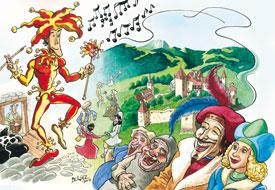The Gruyere Court, which united the simplicity of pastoral mores with the pomp of chivalry, delighted at their court jesters for centuries: Girard Chalamala was the last.
The name Chalamala, "Tsamala" in the idiom of Gruyere, is simply local dialect for the old French word, chalemelle, a type of flute. The Count of Gruyere's jester was a "Tsamala" or flute player, and was thus popularly nicknamed "Girard the Flute". Girard Chalamala cultivated the motley dress of the fool, carrying his jester's bauble, and wearing a large cap adorned with peacock feathers.
In the reign of Count Peter IV, in the mid-14th century, Gruyere endured the pains of war, to the very foundations of its feudal donjon. It was here that Claremboz and Bras-de-Fer of Villars-sous-Mont gained fame and immortality, and that the soldiers of Fribourg and Bern lashed out at the brave defenders of the land. Chalamala sang the praise of these warrior exploits in majestic poems, deliberately intermingling legend, ballads of love and lighthearted narrations that brought such honor to the times of troubadours and trouveres.
As witness to the conquests of Bern and Fribourg, he would often voice his dread, alluding to the warring cities, that sooner or later the "bear" (symbol of Bern) would cook the crane ("grue" in French) in the Fribourg cauldron.
Chalamala died in 1349, having appointed Count Peter as his heir, bequeathing him his debts, his mask, his cap and his fool's bauble.
Source
Thematic route :
A Country of Legends
Text :
Clément Fontaine, from "Sous la bannière de la Grue"
Translation :
Ronald Lindsey
















